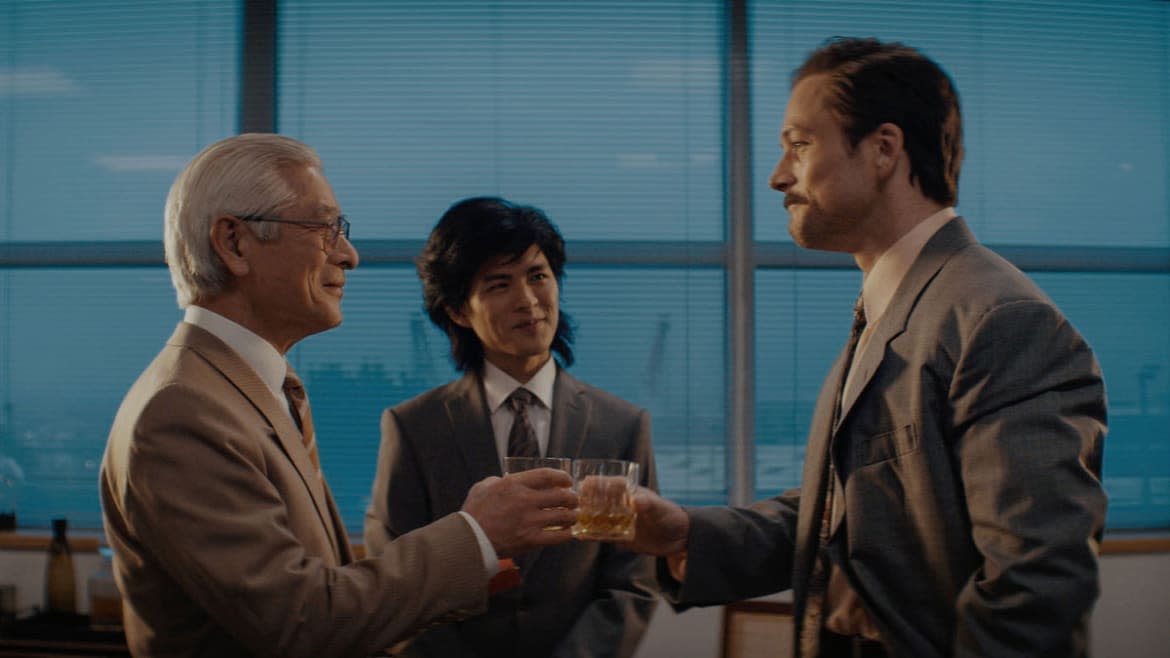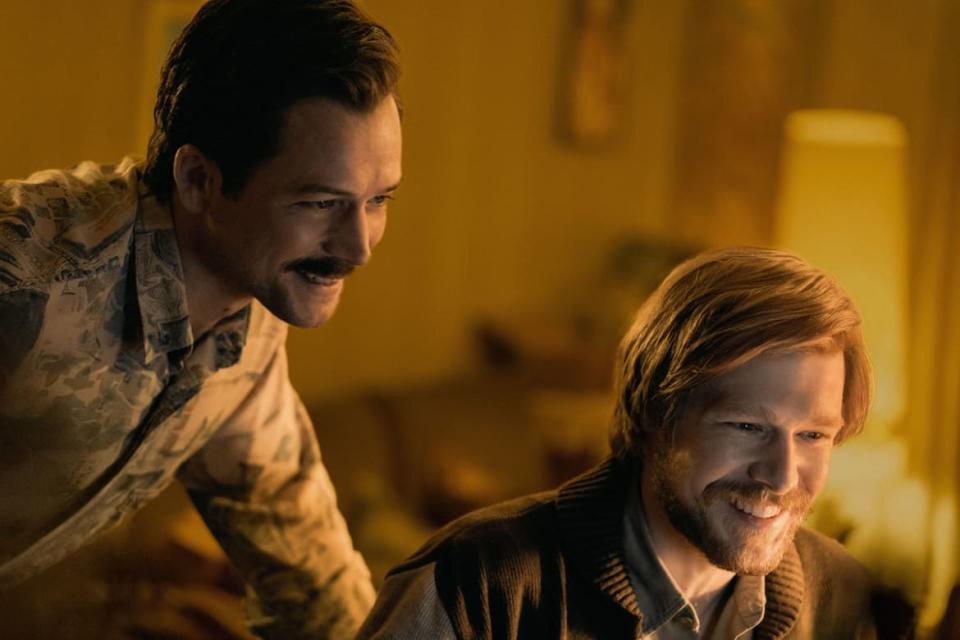‘Tetris’: How Did a Delightful Video Game Make for Such a Boring Film?

There are few joys as pure as playing Tetris, which has single-handedly accounted for millions, if not billions, of hours of lost time. The game’s impossible-to-put-down nature is such that one apocryphal tale claims a Moscovian medical lab banned it for distracting its workers. Outlawing fun? That’s the kind of schoolmarm behavior that American media loves to shock us with when talking about foreign countries, as if we’re expected to forget about our own teachers snatching away our Pokémon cards during elementary school.
Watching Tetris (March 31 on Apple TV+), a film that translates the game’s time-suck quality into something way too literal, it’s impossible to come away without thinking that the USSR was uniquely anti-fun. It was a place where the heads of Nintendo of America (fun personified!) are thrust into a getaway car, chased down by the KGB. It was a place where the mere existence of a game like Tetris could be cause for an international incident.
But director Jon S. Baird’s take on the real story of how Tetris became the biggest game ever is political in the most vapid way. For a game as impactful as Tetris to star in a biopic that continuously downplays the actual game itself is one thing. That Tetris minimizes the game in favor of turning the tale of the game’s American savior into a Cold War-era spy thriller-meets-’80s-action-caper is another.
Tetris opens in 1988 at the annual Consumer Electronics Show (CES). Henk Rogers (Taron Egerton) is an American businessman, currently running the Japanese game development and publishing company Bullet-Proof Software. He’s doing his usual rounds at CES promoting Bullet-Proof’s catalog (like a digital version of Go) and looking for new games to sell abroad, when he notices a slew of people gathered around one computer. They’re playing something called Tetris, Henk learns, and nobody can get enough.
Tetris is a beautifully simple game designed by Alexey Pajitnov, an engineer in the then-Soviet Union. Players must arrange falling blocks into lines, clearing them as fast as possible before the pieces overwhelm the screen. It’s a seemingly endless task that can occupy people for so many hours straight, they see the afterimage of falling blocks once they’ve finally stopped. (This is a psychological phenomenon literally known as the Tetris effect.) Henk falls in love with it, like everyone else. Knowing both a good game and business opportunity when he sees it, he snaps up the Japanese console rights for Tetris.
The game is a great success. But then, Henk finds out that industry titan Nintendo has an industry-changing device in development. In order to get Tetris on the Game Boy, as Henk so desperately wants to do, Bullet-Proof needs the title’s handheld rights. This endeavor leads Henk to uncover a web of legal lies—taking him straight to the Soviet Union, where he must ask the Russians themselves for help.
As we zip along, the movie tosses out era-inappropriate, 32-bit pixelated title cards and pop-ups. These feint at a familiar ’80s-comedy feeling, amped up by Egerton’s expert fast talk (and pornstar mustache). But the generically arcade-y visual flair also hints at Tetris’ disinterest in verisimilitude. Images of animated maps of Russia and coin-bleeding arcade machines have way more colors than any pixel graphics from that era; have the filmmakers ever actually played the original Game Boy Tetris? Worse, one cringeworthy Nintendo reference is paired with a clip from a Zelda game released in 2004. I cannot stress this enough: 2004!

These bland and historically inaccurate flourishes seem to be foreshadowing a twee movie about the boys who made a puzzle game. But things ramp up into the surprisingly self-serious realm—and never leave—once Henk lands in the USSR. There, he runs into an increasingly duplicitous cast of characters, whether it’s the gruff government officials who own Tetris or the British financiers that stole the Western licensing rights in the first place.
As he tries to wrangle and reason with all the rights-holders in order to get Tetris into Nintendo’s hands, Henk establishes himself as our Real American Hero. He is by turns the bright-eyed, bushy-tailed businessman, goofball foreigner, beleaguered family man, and makeshift secret agent. Egerton ably keeps up with these incessant tonal shifts, but they derail not just Henk, but the entire production. As Tetris darts back and forth between the various men hungry for this deceptively simplistic cash cow, it can’t decide which genre of storytelling best serves them or the viewer.
‘The Big Door Prize’ Is the ‘Ted Lasso’ Antidote We Need
Sometimes, Tetris shifts its pieces into the form of a thriller, in which legally licensing the game feels like a metaphor for protecting all of Western democracy. When Henk returns to his hotel after his trip to Elorg, the government body for which Tetris’ creator Alexey Pajitnov (Nikita Yefremov) works, he is beaten and mugged by likely KGB agents that urge him to leave both Tetris and the country alone; once he makes it back into his room, Henk finds it ransacked for good measure. Confrontations in dimly lit, indistinct government buildings haltingly alternate with Henk’s anxiously keyed-up scrambles across a state so unfriendly, you have to wait days for your turn on the phone. Opportunity abounds for high-concept black comedy here—like The Big Short Except Licensing Agreements—but the film would rather lean into the long-winded, unsubtly jingoistic, boardroom spy flick.
Just as often as rich men are lying to each other behind closed doors, Tetris reorganizes itself into a character drama. An authentic biopic, this isn’t, but these scenes bring some humanity to the heightened historical retelling. Henk’s single-minded quest to acquire the game license has alienated his wife and daughter back home, a tension that reminds us of his personal stakes. And as Alexey secretly befriends Henk, the stony-faced Russian opens up his home and life to the gregarious American. Following Henk and Alexey after hours allows the movie to take a breath, and it’s easier to invest in Henk and Alexey’s friendship, mission, and future.
But Tetris, both game and movie, can’t sit still. It speeds through the more intimate moments so we can get back to editing licensing agreements while dodging KGB blackmail and wiretapping. Times when Alexey lets loose and shows off the quirky genius that birthed Tetris are undercut by reminders that he, like all Russians, lives in a constant state of fear. Just a knock at the door is a cause for alarm, especially when he’s got an American hanging out in his house. Such a repetitive thematic refrain infringes upon our time with the true heart of Tetris: its undersung creator and his marvelous creation.

Tetris’ inability to decide what it wants to be is its ultimate downfall, as it goes to over-the-top lengths to keep up the Cold War thriller antics. The film throws snarling, accented villains at a defiant American that keeps outfoxing them. Its eleventh-hour car chase would make for great parody if it weren’t so earnest. Instead of stylishly dramatizing the history of an important video game, Tetris is too attached to its 1980s Hollywood action-blockbuster aspirations.
Unfortunately, Tetris is going straight-to streaming, not to the big screens befitting its self-perception. Having to watch the movie from your couch also makes the choice between Tetris the movie and Tetris the game a lot easier. Once you boot it up (Nintendo Switch owners can play the original Game Boy version with an online subscription, by the way), you’ll see the game’s slogan: “From Russia With Fun!” The movie could have gone with its own take: “From America With Whiplash.”
Liked this review? Sign up to get our weekly See Skip newsletter every Tuesday and find out what new shows and movies are worth watching, and which aren’t.
Get the Daily Beast's biggest scoops and scandals delivered right to your inbox. Sign up now.
Stay informed and gain unlimited access to the Daily Beast's unmatched reporting. Subscribe now.

 Yahoo Movies
Yahoo Movies 
